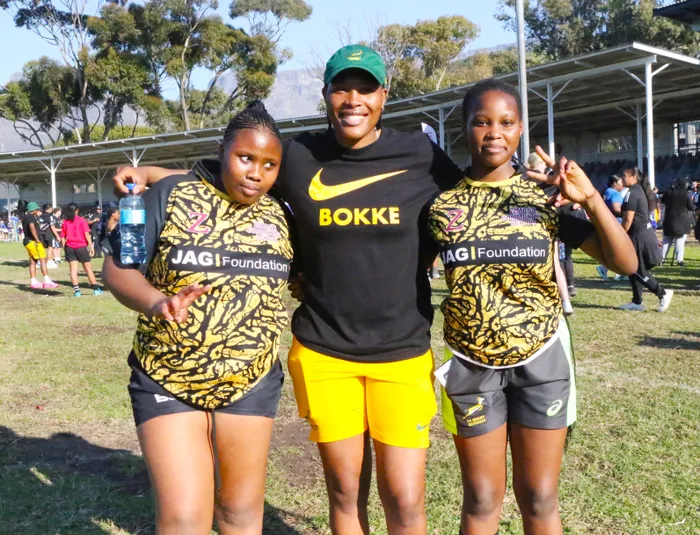SA Rugby has the power to change the lives of an entire generation of women
SHARP TURN

Zimasa Primary School pupils Ayola Godolo and Lisakhanya Matshamba pose with former pupil and current Springbok Sinazo Mcatshulwa. Picture: Buntu Gotywa/Independent Media
Image: Buntu Gotywa/Independent Media
While the Men have one eye on a breakaway R360 league that could ultimately transform the oval-ball game as we know it, Women’s rugby, particularly here in South Africa, is fighting tooth and nail to break free of its shackles.
The Springboks heroic performance at the Women’s Rugby World Cup over the past month has firmly cast the spotlight on the game in South Africa.
For it was only three years ago that Bok Sevens Women’s coach Paul Delport quit his post in huff, stating “I’m not willing to work for people who don’t care about our Women’s Sevens programme.”
He went further by saying “[SA Rugby] don’t give a shit. I’m just resigning because I can no longer peddle a lie to talented young women,” said Delport.
“I don’t know why we’re so backward and conservative in South Africa, the rest of the world has really lit the flame and carried the baton and we’re just mucking around doing nothing.”
These were harsh but true words from the former SA U21 scrumhalf. Even Saru chief Riaan Oberholzer admitted “I think obviously we're quite far behind in starting the seriousness of women's rugby in South Africa.”
Fortunately, since Delport’s outburst, there has been systematic changes within Saru that has helped elevate and transform women’s rugby, particularly with the appointment of the experienced Swys de Bruin to the Springboks along with forwards coach Laurian Johannes-Haupt.
Dave Wessels, the former coach of Super Rugby teams, the Western Force and Melbourne Rebels, as the General Manager for High Performance Rugby at SA Rugby has also made a significant difference, which has ultimately led to the Bok Women progressing to the World Cup quarterfinals.
But the question on everyone’s lips is where to go from here?
The obvious answer is that South Africa needs a sustainable domestic professional women’s league. Only the Bulls Daisies function as a professional outfit and subsequently feed the Bok Women with 14 players in their 32-player squad, but they need competition.
As De Bruyn, so eloquently stated at the Bok arrival media engagement, that Bulls Daisies players are wonderful on attack and enjoy ball in hand, but were simply not accustomed to defending as they are not required to do so on a weekly basis.
The professionalism of the domestic game is critically important for greater reasons too.
I’ve been privileged enough to commentate on the FNB U16 and U18 Girls Weeks in Johannesburg for two successive years.
Tournaments like these are fundamental to the growth of the women's game. I have witnessed the growth from the early stages and seen how the girls’ understanding, physicality and skills have developed over the last two years.
It is imperative that these young girls are not only able to dream about playing for the Springboks one day - in the same manner as a boy at Craven Week - but also know that she is able to forge a career from the sport.
Perhaps due to the sheer numbers within the Bok Women’s team, and who boast superstars such as captain Nolusindiso Booi, prop Babalwa Latsha and No 8 Aseza Hele, that transformation is hardly ever spoken about unlike in the Men’s game.
However, I’m a true believer of the fact that transformation doesn’t only need to rear its head when the numbers are short, but that success stories should also be acknowledged as in the case of the Bok Women’s team.
It is a similar scenario at the Youth Weeks where the talent pipeline is being fed from community schools in areas such as Ngangelizwe and Motherwell in the Eastern Cape, Manenberg in Cape Town and Magoza in Limpopo.
SA Rugby has a responsibility to these young girls to implement systems that will not only help the game prosper, but to also not lose cognisance of the fact they have the power to potentially change the lives of future generations of women living in a country where gender-based violence statistics remains among the highest in the world.
Related Topics: